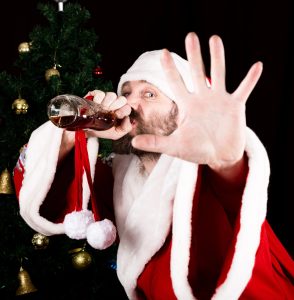The holidays bring joy but they also can bring stress, grief, and even bad habits back to light. It is amazing how a holiday, for some spiritual, and others family orientated can turn grey. Some allow the eustress of the moment to overwhelm themselves and they lose the message. Others face losses of loved one years earlier in the year and are facing the holiday alone for the first time without that person. Finally, others may have addiction issues that are tempted during the holidays. With more parties, drinking and unhealthy diets, individuals may fall prey to a simple taste or drink that can lead to re-opening bad habits.

This is particularly true with substance abuse. Individuals who have remained sober may find the celebration to be too tempting and share in one drink that turns into many. Others may re-awaken the demon of addiction by a simple taste. Hence this time of year can be a big issue for individuals for different reasons. In particular, this blog will look at addiction and drinking as something that can easily wrong during the holiday season. The article, “THE RIGHT WAY TO CARE: Managing addictions during the holidays” by Jennifer Burdo brings to the light the danger of addiction and its re-emergence during the Holidays and how to better manage it. She states,
“If you struggle with substance abuse, be prepared to decline invitations to consume alcohol at a social gathering. It’s also acceptable to decline an invitation to attend a social event entirely. Your peace of mind and stability are most important. Plan ahead to deal with tempting situations. If you are hosting a party, be sure to offer plenty of non-alcoholic beverages. Never question why a person chooses not to drink alcohol or try to push him/her to just have one drink. Alcohol is not a requirement for celebrations. Choose healthy new habits, opportunities to meet new friends and try new activities to limit temptation and the desire to engage in unhealthy habits.”
“THE RIGHT WAY TO CARE: Managing addictions during the holidays”. Burdo, J. (2023). Union-Sun and Journal.
To read the entire article, please access here
Commentary
First and foremost, the mindset of the Holidays is so over secularized that it has become very pagan and alienated from the principles of Hanukkah, Christmas and Thanksgiving. The times are supposed to reflect spiritual values, giving, sharing, family, and religious beliefs. While secularized events, gifts, mythological characters, and exotic dinners are fine, they can become the everything of the season, dismissing the the true elements. When such secularism runs wild without spiritual restraint, then parties and drinking become the central element.
“Overdose on Christmas, Give it up for Lent”
Those words from Robbie Williams song, “Millennium” sum up the whole problem. The idea of feasting and over indulging is so synonymous with especially Christmas. Instead of Christians preparing themselves for the birth of their Savior, within Christianity, most Christians are preoccupied only with the tree and tales of Santa, instead of also incorporating the manager scene and reading Scripture. No idea of sacrifice is employed during Advent, as a time for preparing of the birth of Jesus Christ. Instead, the idea of excess, commercialism and partying replace the time of sacrifice, giving and preparation.

How many Jews and Christians attend services for Hanukkah or Christmas? How many find time to read their sacred scriptures and prepare their souls? The transformation of the Holiday season into a time of partying and buying things has created a dangerous mindset for those with addictive mindsets and because of this new and dangerous re-invention of the Holidays, individuals feel more obliged to over indulge with food, drinking and excessive spending. It is the new spiritual guidelines to follow.
Managing Substance Abuse During the Holidays
Whether one invests in this mindset or not, whether spiritual or secular, those facing addiction have an upward challenge during the Holiday season. They need to prepare themselves for the higher energy and sensory overloads of the season with its obliged indulgences and expected treats. In doing so, those with addiction issues can make it known to family and friends there inability to drink and while not wishing to ruin the fun of others, politely in advance remind family and friends of their addiction issue. If heavy drinking takes place, the individual needs to have the restraint to leave early, or maybe not go. Individuals with addiction should be given alternative beverages at parties. A host who pushes drink on an addicted person or does not provide alternative beverages should be avoided and those parties considered high risk by the addicted.
Others who are not addicted but trying to push back their drinking should consider moderation in consumption of alcohol and sugary treats. The party mentality leads to hangovers, lost time, and greater stress. It is far better to enjoy in moderation and share good times instead of drunken moments of embarrassment. Keep in mind, it is important for addicted and non addicted alike to limit triggers that cause excessive drinking or even having just one. It is important to build boundaries in advance in response to peer pressure. A plan is key for any event and how one will react or respond to temptation.

Please also review AIHCP’s Substance Abuse Counseling Program
Some may even consider different type of events not focused on partying and drinking. There are many spiritual and also non spiritual events on community calendars void of drinking but instead wholesome family fun. One can also find like minded individuals to spend the holidays with that are not centered on partying and drinking.
If hosting, be considerate to those with substance abuse issues and provide what is needed to help them have a fun but safe experience at your home. Unfortunately, many individuals drive drunk during the Holidays leading to drunk and driving deaths and fatalities. The roads can become far more unsafe than the ice on them.
Conclusion
With the proper disposition and attitude toward the season, many poor substance abuse decisions can be prevented. Moderation and enjoyment in balance is the key. For those addicted, it is important to manage where one goes and what parties one attends. Hosts can play a key role in helping those with addiction find alternatives to drink or eat.
If one can make this time far more simpler, consider the grieving, consider the addicted, consider the poor and cold, and in term, moderate in the excessiveness of the season and return to the root of humility and giving, then the season can be less tempting to the addictive and far more productive for society, even if not religious or spiritual.
Bear in mind, such excess of lights, wonderment, and joy not grounded in spirituality, moderation and care of others can lead to a far more disruptive episode after the New Year when many individuals fall into depression.

Please also review AIHCP’s Grief Counseling Program, as well as its Spiritual and Christian Counseling Programs, and also its Substance Abuse Counseling Program. The programs are online and independent study and open to qualified professionals seeking a four year certification.
Additional Resources
“10 Tips to Combat Substance Abuse during the Holidays”. Centerstone. Access here
“Navigating the Holidays With a Substance Use Disorder”. (2020). Psychology Today. Access here
“Some Common Holiday Addiction Triggers, & How to Avoid Them”. McClernon, D. Recovery Centers of America. Access here
“Supporting Those in Recovery During the Holidays”. Glordano, A. (2021). Psychology Today. Access here
